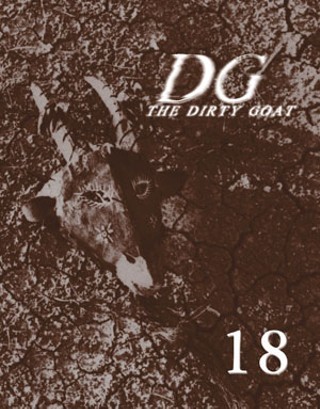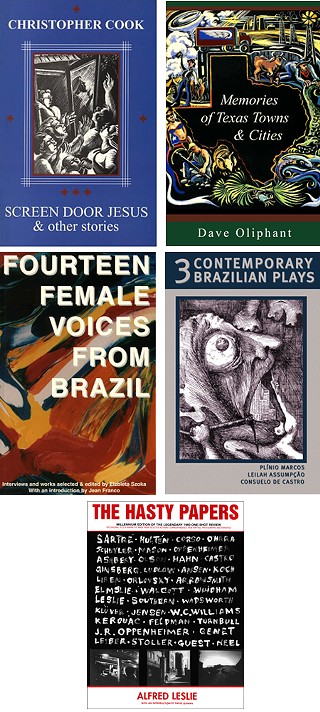Get Your Goat
A homegrown literary magazine celebrates 20 years of playing Host to Texas and the world
By Michael Agresta, Fri., Jan. 11, 2008

This month marks the 20th anniversary of The Dirty Goat, the long-running literary journal based in Austin and New York City. From humble roots in 1980s Austin, when each new volume was launched with a keg party in Harris Park, the journal has expanded in size and reputation – as has Host Publications, the independent press that grew up around it. From its new headquarters in downtown Manhattan, Host continues to deliver high-quality international literature with friendly, irreverent energy and a Texas drawl.
Joe W. Bratcher III, Host's president and co-founder, has overseen every aspect of The Dirty Goat's production from the start. Over the past three years, he has brought on two full-time employees to help with marketing and editorial management. Still, the business retains a homespun feel. While his press aims to provide a welcoming home for guest voices from around the globe, Bratcher looks to his own hometown for grounding. Despite his new base in the land of Condé Nast, W.W. Norton, and Random House, Bratcher still considers Host Publications an Austin press.
"I want the identity of the company to be a non-New York press," Bratcher says. "It's a very independent-minded company. I moved away from Austin in 1995. When I go back, Austin has changed a lot, but I'm holding on to this ideal Austin that I grew up in, in the 1960s, when it was a small town and you could do intellectually interesting things there and there would be people who would just be curious about what was going on and what you were doing. My idea was just to put material out there so that people could experience it."
Most of the material Host has put out over the years is of international origin. Way back in 1987, Bratcher and his wife, Elzbieta Szoka, finished their doctorates at the University of Texas and graduated into a tough job market. Szoka, a Portuguese literature Ph.D., called on her academic contacts to put together Host's first title, 3 Contemporary Brazilian Plays. That book became a model for much of Host's catalog – new or underexposed voices in fresh translation for the academic and specialty market. Authors have included Italian story writer Massimo Bontempelli, who might have coined the phrase "magic realism"; leading Uruguayan poet Ida Vitale, whose political exile eventually led her to settle in Austin; and French flaneur-poet Jacques Réda.
At the center of all this multilingual activity stands The Dirty Goat. The journal has often served as a gateway for new authors and translators and as a way for Bratcher to get to know artists and decide if they would fit in Host's catalog. The Goat also tends to feature a hearty portion of American, English-language poetry and prose – often with roots in experimental traditions. "The amount of material we've gotten in these 18 issues," Bratcher says, "and the consistency of it – bilingual Chinese, Yiddish, Greek, interviews with people from around the world – that's my proudest accomplishment. I love doing the books, and I'm proud of every book we've done, but when it comes to doing The Dirty Goat, that's really it."
The first issue of The Dirty Goat, published in 1988, bore an inscription by Polish poet Aleksander Wat, referring to "smelly, comic, and worthy goats" who forage in the aftermath of men's glory and disasters. That issue also featured New York painter Alfred Leslie, who would become a central figure in the story of Host Publications. Bratcher and Szoka met Leslie soon after founding Host. As Bratcher tells it, Leslie agreed to contribute prints to the inaugural issue of The Dirty Goat on the basis of the name alone. It was a significant celebrity endorsement for the fledgling journal.

Over the next decade, Bratcher worked to repay the favor, creating a large-scale, page-by-page reproduction of Leslie's 1960 collaborative masterwork, The Hasty Papers. Papers includes photographs, drawings, paintings, plays by John Ashbery and Aristophanes, two sort-of novels, poems by Kenneth Koch and other New York School poets, an essay on the paintings of Hitler and Churchill, and the full text of a Fidel Castro speech. When the Chronicle reviewed Host's edition in 2000, we wrote that it achieved "a highly respectable authority in depicting not just one city or one group of thinkers, but a world and its troubles in a tiny and critical time – and with a smoke-flavored tongue kiss, at that." Bratcher considers the volume one of Host's greatest accomplishments and does not think it out of place on the shelf with its international cousins. As if building on the "one-shot review" style of The Hasty Papers, Host Publications and The Dirty Goat make space for a messy melding of different traditions, yielding a prismatic window onto new ideas from around the world.
More recently, Bratcher has developed a new publishing interest – Texas literature. Host has published two books by local poet Dave Oliphant, whom Bratcher first got to know as a translator of Spanish-language poetry. One of Oliphant's books, Memories of Texas Towns & Cities, actually contains a 140-page epic poem about Austin. Every poem in the collection takes the name of a Texas city, but Longhorn partisans will be happy to know that Oliphant managed to cover Bryan in a single page.
Christopher Cook's Screen Door Jesus, a collection of short stories about East Texas, led Bratcher and Szoka to branch out once again, this time into filmmaking. According to Bratcher, every time Host published a book, beginning with 3 Contemporary Brazilian Plays, he would mention to his wife that they ought to make a movie out of it. With Screen Door Jesus, she finally agreed, and the two collaborated as producers. The film was shot in Austin, Lockhart, and Bastrop, featuring a cast of local actors, and it premiered to good reviews at 2003's South by Southwest Film Festival. Unfortunately, Hurricane Rita disrupted the Gulf Coast-focused opening weekend, which ruined chances of a wider release. (Screen Door Jesus is now available on DVD.) Szoka now devotes much of her time to film, and she and Bratcher are collaborating on a new movie, now in postproduction.
The last few years have seen Host transform from a micropress run out of Bratcher's home into a 10-book-per-year operation with professional offices in two states. In Austin, fulfillment runs out of a small office on East Seventh Street. In New York, Host's new digs are within a few blocks of City Hall, the Brooklyn Bridge, and Wall Street. Szoka, no longer involved in the day-to-day operations of Host, is learning the language of Hollywood to prepare for more potential adaptations. Despite all this recent growth, Bratcher says that he aims for a happy medium.
"I don't want to grow anymore," he says. "I want to sell more books, but I'm very comfortable with the number of books we are producing per year. I don't want to lose control of what we're doing. It's already getting so that I can't remember; I need to have a piece of paper or a catalog in front of me to remind me what books we're doing. I don't want it to get any bigger than that."
The outdoor keg parties may have fallen by the wayside in favor of wine and cheese receptions, but the small-town feel is still alive on lower Broadway. The secret of his success, Bratcher says, is that he didn't expect to get rich. "You have to accept from the beginning that you can't be frustrated that you aren't bringing in a lot of money. That's the first thing. The second thing is to be curious. I got a Ph.D in English literature. I love books. I like reading all the bad submissions I receive. I wish I could publish twice the books that I do, if I had the time. It's the curiosity and the energy of loving books and not being stuck in a single mode. I find that I discover other countries by reading literature from those countries."
Bratcher is not alone in his sense of discovery. Over the past 20 years, Host Publications and The Dirty Goat have done a great deal to make the world of arts and ideas a little bit more intimate, welcoming guests from near and far, celebrated and obscure, to sit at the same table. Here's to our generous Host.
The Dirty Goat 18 goes on sale in January. To order an issue, visit www.thedirtygoat.com or call 236-1290. To see Host Publications' back catalog, visit www.hostpublications.com.








